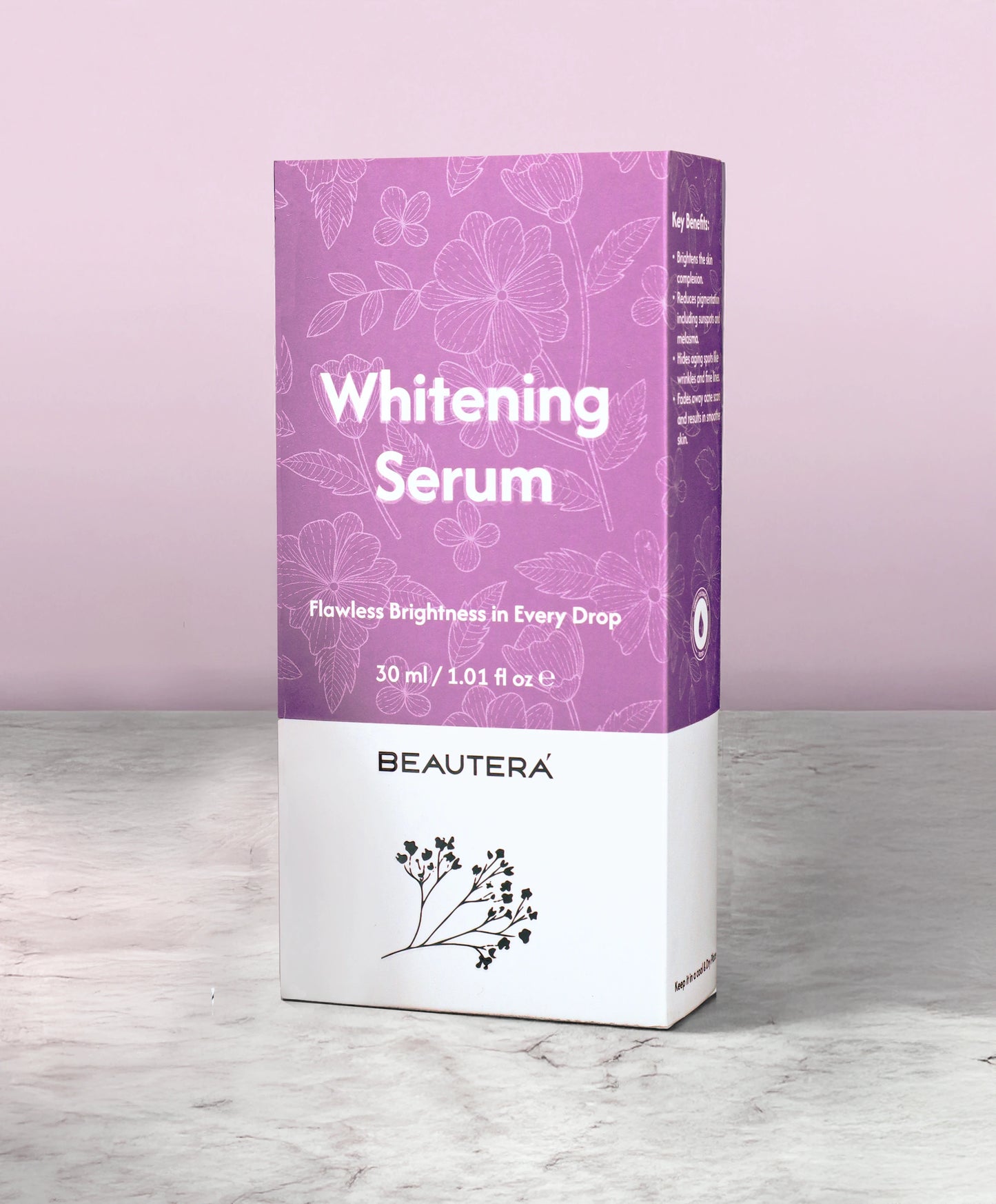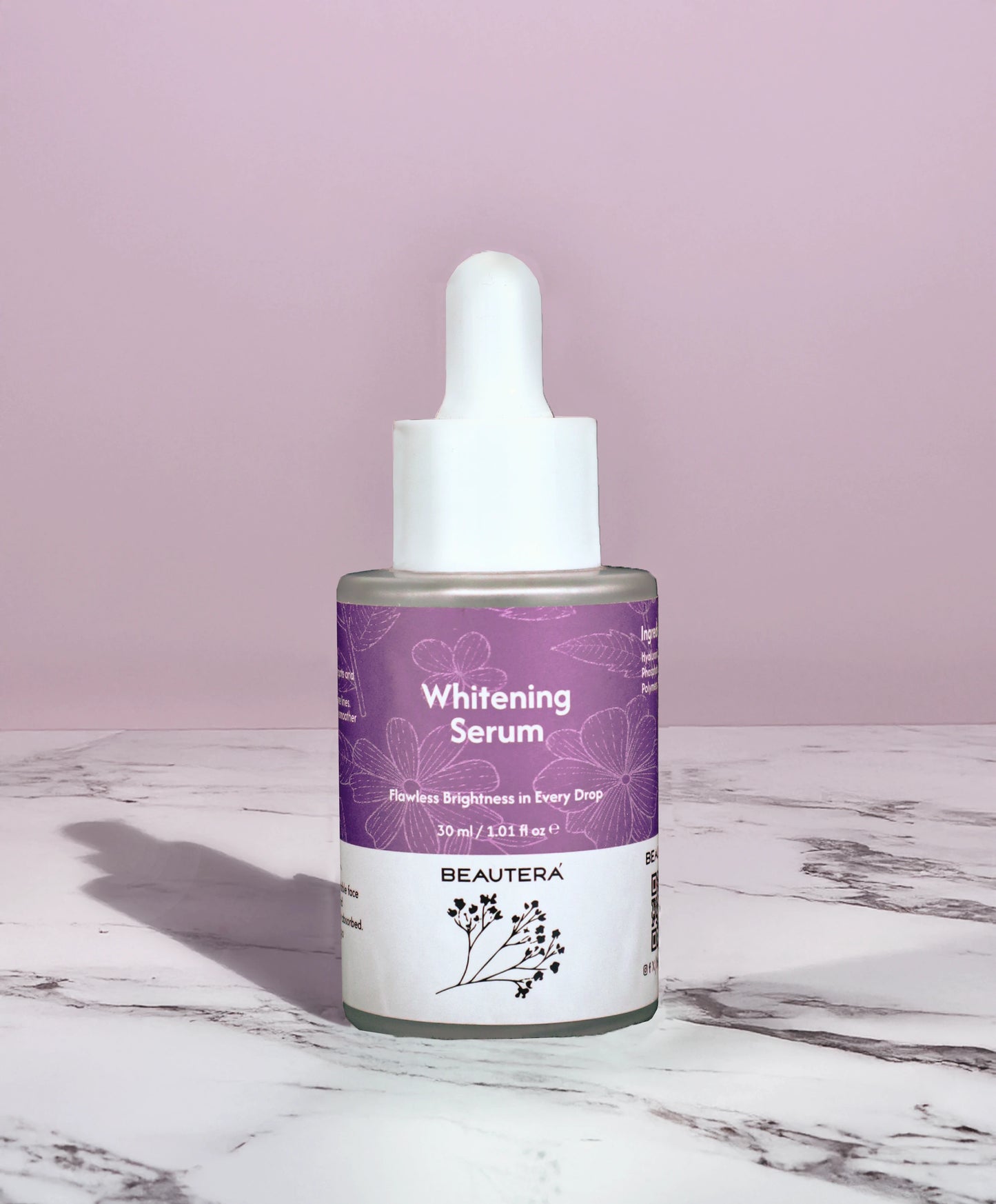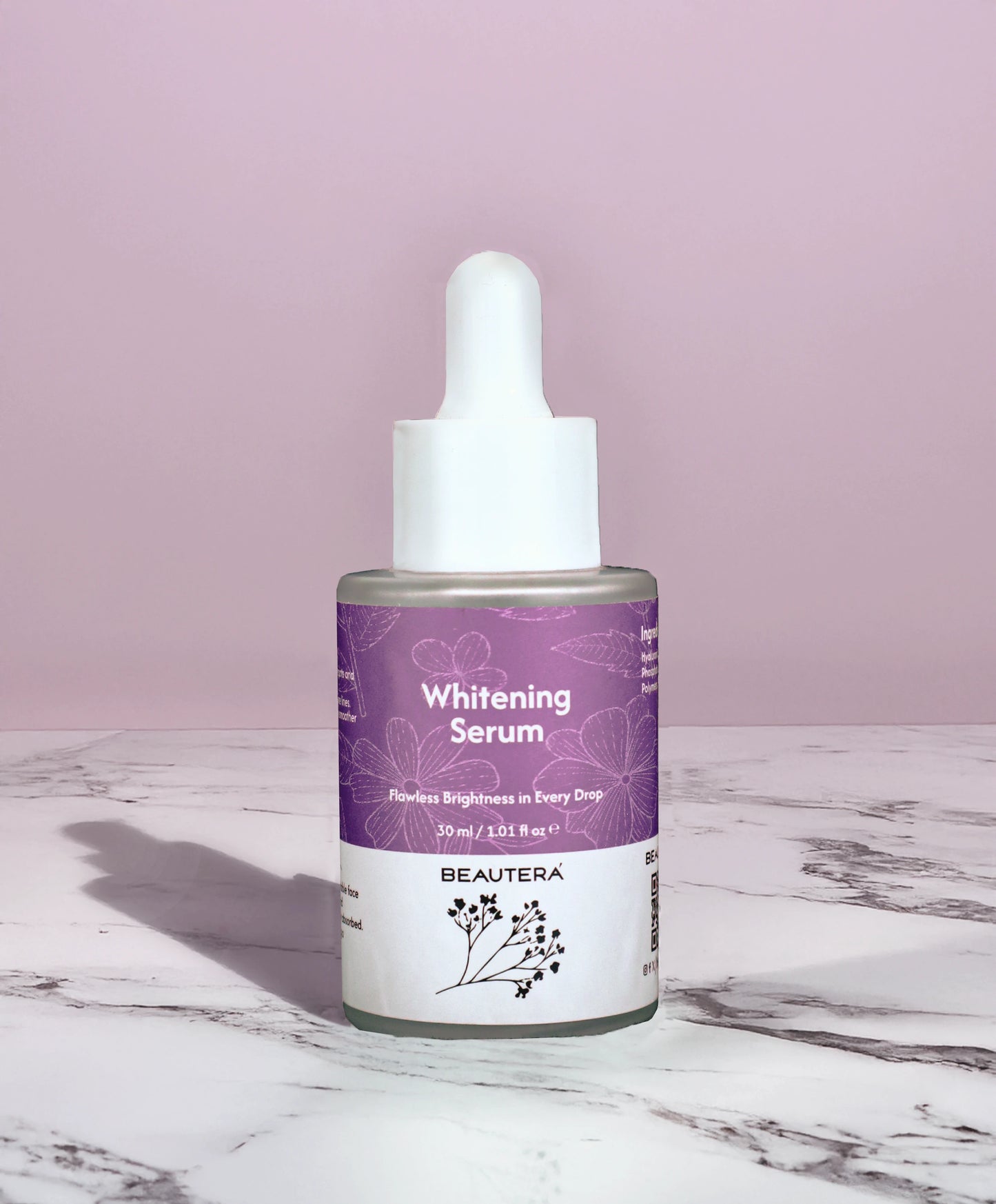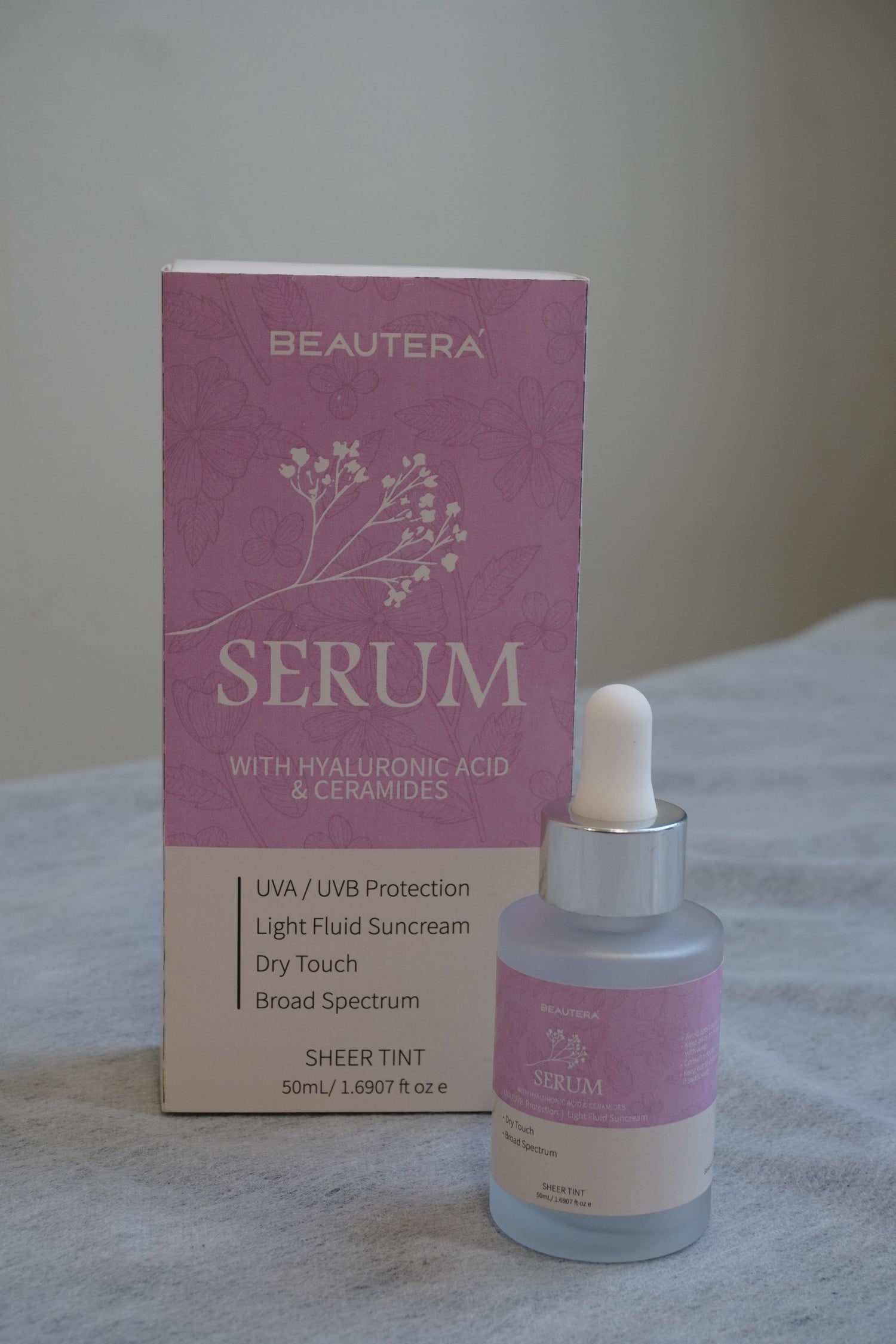Whitening Serums
Beautera
Whitening Serum
Share




The Best Whitening Serum in Pakistan
Beautera offers the best skin whitening solutions, including the best skin serum for glowing skin. Our whitening serum is formulated with the best ingredients that encourages a radiant and bright complexion. Our best skin serum for glowing skin addresses common skin conditions like dark spots, aging spots and sun damage. It also hydrates and moisturizes the skin, keeping it supple. Our whitening serum is suitable for all skin types, including sensitive skin as it doesn’t contain any harsh substances or fragrances.
So, get our best skin serum for glowing skin at Beautera to improve your skin complexion.
Ingredients in Our Best Whitening Serum
Our whitening serum is formulated with the best ingredients.
-
Kojic Acid
Our best skin serum for glowing skin at Beautera is made with kojic acid. By preventing the enzyme tyrosinase from functioning, this ingredient reduces the amount of melanin - the pigment that gives skin its color. As a result, it can effectively remove age spots, black spots, and hyperpigmentation, giving the face a more even tone. Kojic acid finds substantial application in anti-aging products. In addition, it can make skin seem younger by fading dark spots and even out skin tone. Its antioxidant qualities also aid in the fight against free radical damage, which can exacerbate aging symptoms like wrinkles and fine lines.
-
Vitamin E
Beautera whitening serums are also made with vitamin E. This strong antioxidant is essential for safeguarding the skin from oxidative damage. Free radicals are unstable chemicals that may harm cells, speed up aging, and worsen a variety of skin disorders. Just like ferulic acid, vitamin E can also neutralize them. Vitamin E contributes to the preservation of the skin's integrity and health by halting oxidative damage. It functions as a natural emollient, reducing dryness and assisting in preserving the moisture balance of the skin.
-
Glycerin
Our whitening serums include glycerin. As a potent humectant, glycerin draws moisture from the surrounding air into the skin. Because of this, it's among the best ingredients for moisturizing and preserving the skin's moisture balance. Glycerin keeps the skin elastic, smooth, and soft by attracting and retaining water in the skin, preventing flakiness and dryness. Not just that, glycerin is essential for improving the skin's protective barrier. By retaining moisture and protecting the skin from irritants and pollutants, it helps to fortify the skin's natural defenses against environmental aggressors. Glycerin usage on a regular basis may greatly enhance the skin's texture and look. It helps to improve the skin's natural radiance, smooth out rough areas, and lessen the appearance of fine lines and wrinkles.
Benefits of Our Best Whitening Serum
Our best skin serum for glowing skin offers many skin benefits.
-
Makes the Skin Even
Our whitening serums work by minimizing discoloration, dark spots, and hyperpigmentation to give the skin a more even tone. They frequently include glycerin and kojic acid, which reduce the development of melanin and lighten pre-existing dark spots for a more even-toned complexion.
-
Reduces Aging Spots
Antioxidants and other anti-aging compounds are included in our best skin serum for glowing skin, which aid in combating aging indications. These serums help decrease the visibility of fine lines, wrinkles, and other age-related skin issues by minimizing dark spots and enhancing skin texture. This two-pronged effect contributes to a more rested and youthful appearance.
-
Improves Skin Texture
The texture of your skin might become smoother and more polished with regular usage of our whitening serums at Beautera. These serums serve to level out the skin's surface, giving it a smoother, more polished appearance and a softer feel by encouraging cell turnover and decreasing pigmentation. This texture enhancement makes the skin seem better overall.
-
Reduces Acne Scars
Beautera whitening serums can be especially helpful for people who have acne-related post-inflammatory hyperpigmentation. Alpha arbutin, licorice extract, and niacinamide are among the ingredients that assist in lightening acne scars and blemishes, resulting in a skin tone that is clearer and more uniform.
-
Hydrates the Skin
Our best skin serum for glowing skin frequently contains nourishing and moisturizing ingredients that are good for the skin's general health. Hyaluronic acid, glycerin, and plant extracts are included in our whitening serums as they offer moisture and vital nutrients to the skin, keeping it moisturized, plump, and supple.
Best Candidates for Our Best Skin Serum for Glowing Skin
Our whitening serums are most suited for patients who have hyperpigmentation, such as age spots, melasma, or dark spots.
Beautera whitening serums are beneficial for those who have been sunburned and have freckles, sunspots, or uneven skin tone as a result of continuous UV exposure.
Our best skin serum for glowing skin can be used by individuals with post-inflammatory hyperpigmentation (PIH) brought on by eczema, acne, or other skin traumas to lighten dark spots and scars.
Whitening serums are useful for everyone who wants to improve the brightness of their skin and attain a more radiant, glowing complexion.
Our whitening serums can help people with naturally uneven skin tones—whether from genetics or environmental factors—achieve a more uniform complexion.
Our whitening serums are beneficial for patients with acne-prone skin who still have dark areas or scars from previous outbreaks.
How to Apply Our Best Whitening Serums Correctly?
Follow these tips to apply our whitening serum to your skin correctly.
-
Clean your Face
To begin with, properly cleanse your face to get rid of any debris, oil, or makeup. Use a moderate cleanser that suits your skin. By taking this step, you can make sure that the whitening serum works as best it can and can permeate your skin more deeply.
-
Apply a Toner
Use toner to regulate the pH of your skin after cleaning in order to improve the serum's absorption. Make use of a toner appropriate for your skin type and issues. High alcohol content toners should be avoided as they might cause skin dryness.
-
Test it On Your Skin
Remember to do a patch test first before using our whitening serum all over your face. A tiny amount of the serum should be applied to a discrete region of your skin, such as your wrist or the area behind your ear. Wait for any negative effects, such as redness, itching, or irritation, for a full day or two.
-
Take a Small Amount of Serum
Start with a tiny amount of the serum while using it for the first time to evaluate how your skin responds. Usually, a pea-sized quantity is plenty. As your skin becomes more tolerant to the product, gradually increase the serum’s dosage.
-
Apply it Correctly
Using your fingertips, evenly distribute the serum over your face. Instead of rubbing the serum into your skin, gently pat it in. This reduces needless discomfort and facilitates the serum's penetration more successfully.
-
Use a Moisturizer
Give the serum a few minutes to properly sink into your skin after applying it. After that, use a moisturizer to seal in the serum and give your skin even more moisture. Select a moisturizer that is appropriate for your skin type and works well with the whitening serum.
-
Store the Serum in Safe Place
Keep your whitening serum out of direct sunshine and heat, in a cool, dark spot. The efficacy of the serum may be diminished by the active components' deterioration due to light and high temperatures.
Why is Our Whitening Serum at Beautera the Best?
At Beautera, we offer the best whitening serum for glowing skin.
-
Targets All Skin Problems
First and foremost, you must think about your skin concerns. Do you want to address hyperpigmentation, dark spots, or uneven skin tone? Or do you want to get rid of fine lines or acne scars? Identifying this will help you find a good whitening serum.At Beautera, we offer the best whitening serum in Pakistan because our serum targets all skin concerns. Our whitening is formulated with the best ingredients that address dark spots, pigmentation and uneven skin tone. This makes it suitable for people who want to address common skin problems and get loans can.
-
Suitable for All Skin Types
Beautera offers the best skin serum for glowing skin which is suitable for all skin types. Our formulation of the whitening serum is designed for different skin types, including sensitive skin. Our whitening serum includes hydrating ingredients to keep the dry skin moisturized and nourished. Similarly, our whitening serum contains calming ingredients for sensitive skin.
-
Safe Ingredients
Before buying a whitening serum, you must look at its ingredients. That is why we have come up with a whitening serum that includes safe ingredients. Our formulation of the whitening serum is safe and effective to get glowing and radiant skin.
FAQS
Can you use whitening serum daily?
Generally, you can use whitening serums daily. However, since it contains active ingredients in high concentration, it is recommended to consider the formulation and your skin needs before adding them to your daily skincare routine. Our whitening serum at Beautera is safe to use every day.
Should you leave the serum overnight?
Yes, it is recommended to leave this overnight. This is because the whitening serums need time to absorb in the skin and your skin is most receptive when you are sleeping. Therefore, applying serum before going to sleep can be effective.
Which is the best whitening serum?
Beautera offers the best whitening serum that gives a brighter and more radiant skin complexion. Get the best skin serum for glowing skin here and boost your skin complexion.

